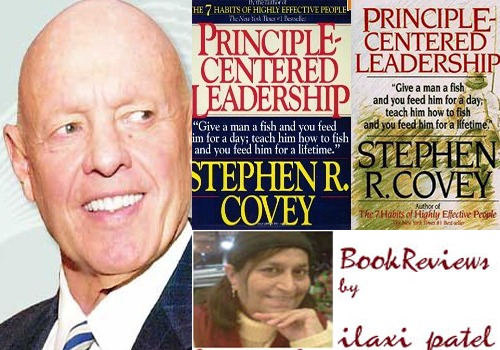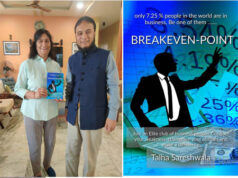Principle Centered Leadership By Stephen R Covey
Review by ilaxi patel
Stephen Covey left a rich legacy behind him when death laid its icy hands in 2012. Over his lifetime, Stephen inspired millions with the power of universal principles.
As he traveled the globe many times over, his message was a simple one: for true success and meaning in life, we must be principle-centered in all areas of life. A teacher at heart, he often taught: “there are three constants in life: change, choice and principles.”
Covey was the author of acclaimed books, including the international best seller, The 7 Habits of Highly Effective People, which has sold more than 25 million copies in 40 languages throughout the world. Other best sellers authored by Covey include First Things First, Principle-Centered Leadership, The 7 Habits of Highly Effective Families, and The 8th Habit: From Effectiveness to Greatness.
Some other books authored by Covey include Everyday Greatness: Inspiration for a Meaningful Life (2006), The Leader in Me: How Schools and Parents Around the World Are Inspiring Greatness, One Child at a Time (2008), Predictable Results in Unpredictable Times (2009), Great Work, Great Career (2009), and The 3rd Alternative: Solving Life’s Most Difficult Problems (2011).
I was introduced to this amazing world of books of Stephen Covey when students came with their assignments and needed help to write for Management Book review submission.
This is my previous read of Stephen Covey ‘Principle Centered Leadership’ – Give a man a fish and you feed him for a day…the very quote says a lot. Stephen Covey opens up your mind to the permanent things – values, family, relationship, communication. He gives an insight to create a long-term meaningful relationship and be success at workplace and home. Covey offers guidelines and tips on how to achieve a more principle-centered perspective, including charts, lists, concept maps, and many memorable quotes scattered throughout the text. He defines how to increase quality and productivity by impressive charts as :
*
*Four Levels of Principle centered leadership with key principles
*Seven habits maturity Continuum
*Power Process
*Pyramid of Influence
*Four Paradigms
*Six Conditions of Empowerment
Divided into section 1 and 2, the book has 31 chapters – each one a unique approach with powerful reading with his principles of vision, leadership and human relationships.
Section 1 deals with Personal and Interpersonal Effectiveness
Section 2, focus on Managerial and Organizational Development.
In Principle-Centered Leadership, you may find answers to some of the
problematic questions that arise at home and at work:
• How do we achieve and maintain a wise and renewing balance between
work and family?
• How can we be empowered (and empower other people) with confidence
and competence to solve problems and seize opportunities?
• How do we unleash the creativity, resourcefulness, talent, and energy of the
vast majority of the present work force?
• How do we turn a mission statement into a constitution?
In his book Principle-Centered Leadership, Stephen Covey encourages us to utilize four central principles (security, guidance, wisdom, power) as the core in our personal and
Professional lives. Covey believes that centering our lives on these principles is “the key to developing rich internal power in our lives”
In Chapter 1, Covey identifies eight defining characteristics of people who are principle-centered leaders:
1. They are continually learning.
2. They are service-oriented.
3. They radiate positive energy.
4. They believe in other people.
5. They lead balanced lives.
6. They see life as an adventure.
7. They are synergistic.
8. They exercise for self-renewal.
In Chapter Seven, the Author focus on Seven deadly sins referring to Mahatma Gandhi’s quote:All to do with social and political conditions:
*Wealth without work
*Pleasure without conscience
*Knowledge without character
*Commerce without morality (Business without ethics)
*Science without humanity
*Religion without sacrifice
*Politics without Principle
He charts out how the seven habits will help you avoid seven deadly sins. Stephen Covey’s Thirty Methods of Influence in Chapter 11 centers on positive influence with people in our personal and professional lives. He explains how we can powerfully and ethically influence to win new business, keep customers, maintain friendships, change behaviors or improve marriage and family relationships.
Covey identified seven chronic problems that can be found universally :
1. No shared vision or values.
2. No strategic path.
3. Poor alignment.
4. Wrong style
5. Poor skills.
6. Low trust.
7. No self-integrity
Covey lists 30 methods of Influence and overcoming three big mistakes. For the influence paradigm, it is best to go in details as to powerfully and ethically influence the lives of other people. Specifically, there are three basic categories of influence – to model by example, to build caring relationships as to what others feel and to mentor by instructions.
Covey has encouraged his readers to change the paradigm with which they view leadership. He acknowledges that there are different leadership paradigms out there (i.e., scientific authoritarian, benevolent authoritarian, human resource), but he believes principle-centered leadership is the leadership paradigm that is most holistic. Principle-centered leadership “embraces the principles of fairness and kindness and makes better use of the talents of people for increased efficiency, but also leads to quantum leaps in personal and organizational effectiveness”
Chapter 13 about Marriage, family and children. Making champions of your childen is one chapter that weighs stress to build their self esteem with added scoops of guidance. Making Champions of Your Children
1. Build your children’s self-esteem.
2. Encourage primary greatness.
3. Encourage your children to develop their own interests.
4. Try to create an enjoyable family culture.
5. Plan ahead for family events.
6. Try to set an example of excellence.
7. Teach them to visualize so that they can recognize their own potential.
8. Adopt their friends.
9. Teach your children to have faith, to believe and trust others, and to affirm, build, bless and serve others.
In Chapter 18, Six Conditions of Empowerment, four are categorized as Win Win Agreement, Self Supervision, Helpful Structure and systems and finally, Accountability. Two remaining are Skills and Character. Covey specifies on three most critical skills which are communication, planning and organization, and synergistic problem solving because these three personal skills enable an individual to establish the other four conditions of organizational effectiveness. The six conditions are so interdependent that if any of them is throw out of balance, it will immediately affect the other five.
In Chapter 31, Principle centered Learning Environment, what Covey suggests is shifting the traditional student-teacher relationship to a model in which we create a principle-Centered Learning Environment. In this environment, student is empowered. Each stakeholder has and shares equal responsibilities for providing best learning environment for children to grow and become empowered. For instance, the educational family includes the Central office administration, the school board, the building level administration and the teacher.
This Book becomes a practical teaching tool for business leaders. Covey’s Principles make a great sense and I recommend this book for all existing and future leaders who would like to scale high with the perfect blend of Stephen Covey’s wisdom, compassion and practical experience. Good Pick.








